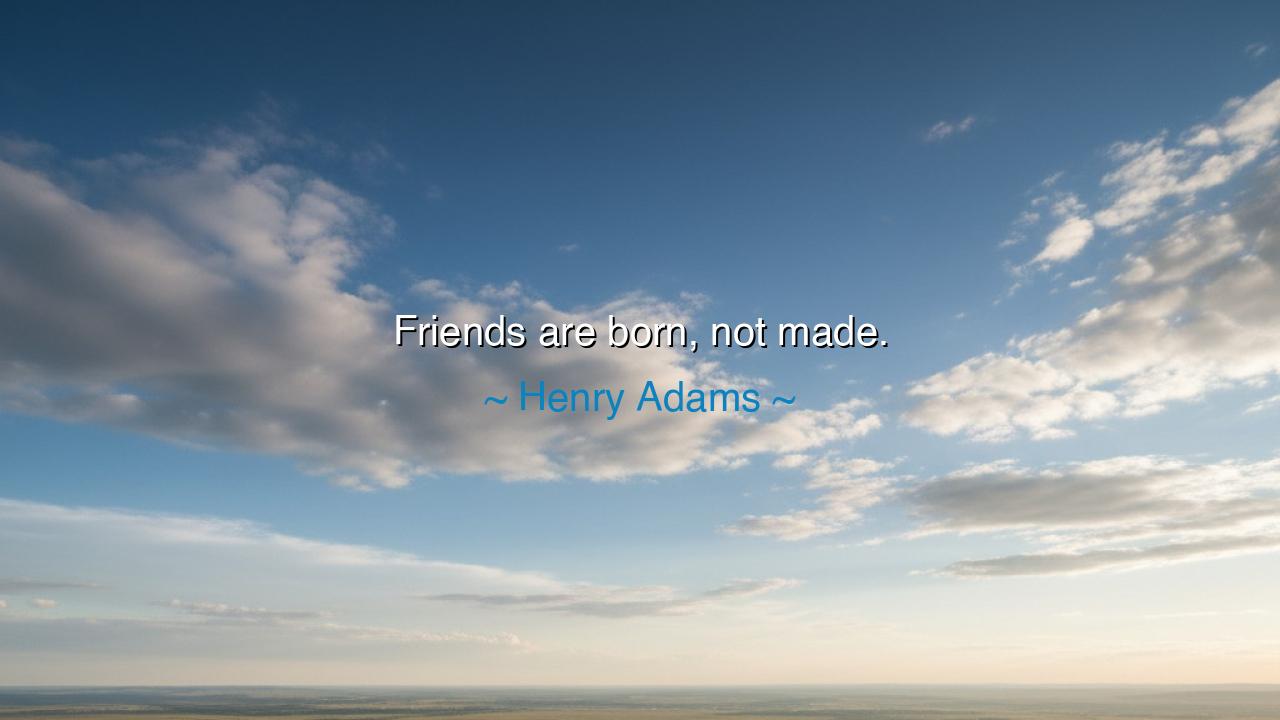
Friends are born, not made.






In the brief yet immortal words of Henry Adams, historian, philosopher, and chronicler of human nature, we find a truth that glows like an ember in the hearth of the soul: “Friends are born, not made.” These few words, simple as they seem, carry the weight of centuries of human experience. Adams speaks not of friendship as a thing constructed or acquired through effort, but as something destined, something written in the hidden fabric of existence. He tells us that friendship — true and sacred friendship — is not manufactured by convenience or bound by circumstance, but born of spirit, as though two souls, meeting in the vastness of life, recognize each other from an older, deeper realm.
To say that friends are born is to speak of the mysterious harmony that exists between certain souls. There are those we meet along the journey of life with whom we exchange words, pleasantries, and shared duties — companions, allies, acquaintances. Yet, among them, a few stand apart. With them, there is no need for introduction, no slow cultivation, no delicate balance of effort and gain. It is as if the universe, in its infinite wisdom, placed two wandering spirits upon converging paths, whispering to each, “Here is one who knows your heart.” From the first meeting, something ancient stirs — a recognition, a kinship that transcends time. Such friendships are not built by choice, but awakened by destiny.
The origin of Adams’s thought comes from a lifetime spent observing the rise and fall of human connections. Born into one of America’s most distinguished families — the grandson and great-grandson of presidents — he moved among people of influence, intellect, and ambition. Yet, he saw that proximity and opportunity do not create friendship. Many around him sought alliance, not understanding. Their relationships were based on gain, not grace. Adams, in his quiet reflection, realized that friendship of the truest kind cannot be formed by will or circumstance. It springs from the depths of nature itself — as instinctive as love, as inevitable as dawn. “Friends are born, not made,” he wrote, to remind us that the deepest bonds of life cannot be forged by design; they are discovered, as if already waiting for us since the beginning of time.
This truth has echoed through the ages, spoken differently by the sages of every civilization. The Greeks called it philia, a friendship of virtue — a joining of souls who seek the good in one another. The Chinese philosopher Confucius said that friendship is “one mind in two bodies,” born of harmony, not contrivance. And in the ancient Indian texts, it is said that certain souls are bound together over many lives, drawn again and again until their love is perfected in understanding. Thus, Adams’s words belong not merely to his time, but to the timeless rhythm of human wisdom. He gives voice to the mystery that friendship is not something we create, but something we remember — a reunion rather than an introduction.
History, too, bears luminous witness to this truth. Think of David and Jonathan in the Hebrew scriptures — a prince and a shepherd, divided by duty but united by destiny. Theirs was a bond not of blood or benefit, but of soul. When they met, it is written that “the soul of Jonathan was knit with the soul of David.” No negotiation, no slow building — it was immediate, as if two sparks merged into one flame. Or recall the friendship of Socrates and Plato, master and disciple, bound not by circumstance but by a shared pursuit of truth. Plato did not “make” Socrates his friend; he was drawn to him by the same divine gravity that pulls all kindred spirits together. Such friendships seem fated — they are born, not built.
Yet Adams’s words also carry a quiet warning. Because true friendship is born, not all who surround us will share its depth. Many will come into our lives for reasons of need, ambition, or mere passing comfort. We must learn to distinguish the born friend — the one whose soul moves in harmony with ours — from the multitude of companions who only travel beside us for a time. To chase friendship is to cheapen it; to wait for it is to honor its sacred origin. The soul that is patient and open will, in its season, find the other soul that completes its understanding — and when it does, that friendship will be effortless, eternal, and pure.
The lesson of Henry Adams, then, is this: do not seek to manufacture what must arise naturally. Be authentic in yourself, for only through authenticity will your kindred spirits recognize you. Do not craft friendships for advantage or comfort, for such bonds fade like mist in the sun. Instead, cultivate the qualities that draw true friends — truth, kindness, humility, and courage. Live deeply, speak sincerely, and move through life with openness of heart. For friendship, like love, comes not when called, but when earned through the silent radiance of the soul.
So, dear listener, let these words rest upon your heart: “Friends are born, not made.” Trust the mysterious weaving of life, for somewhere upon its path walks the soul that mirrors your own. You may not yet have met, or perhaps you have — but when you do, you will know. There will be no effort, no striving, no fear. The conversation will begin as if it had never paused, and the silence between you will be full of peace. For true friendship is not an act of creation, but of recognition — the rediscovery of a bond written long before time began.






AAdministratorAdministrator
Welcome, honored guests. Please leave a comment, we will respond soon